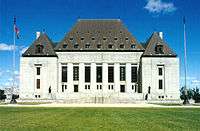R v Wong
| R v Wong | |
|---|---|
|
| |
| Hearing: May 2, 1990 Judgment: November 22, 1990 | |
| Full case name | Santiago Wong v Her Majesty The Queen |
| Citations | [1990] 3 SCR 36, 1990 CanLII 56, 60 CCC (3d) 460, 1 CR (4th) 1, 2 CRR (2d) 277, 45 OAC 250 |
| Docket No. | 20549 |
| Prior history | The trial judge acquitted the appellant and ruled video surveillance as inadmissible. The Court of Appeal for Ontario allowed the appeal against acquittal and ordered a new trial. |
| Holding | |
| The appeal should be dismissed because admission into evidence of the videotape would not bring the administration of justice into disrepute. | |
| Court Membership | |
|
Chief Justice: Brian Dickson Puisne Justices: Antonio Lamer, Bertha Wilson, Gérard La Forest, Claire L'Heureux-Dubé, John Sopinka, Charles Gonthier, Peter Cory, Beverley McLachlin | |
| Reasons given | |
| Majority | La Forest J., joined by Dickson C.J., L'Heureux-Dubé and Sopinka JJ. |
| Concurrence | Lamer C.J., joined by McLachlin J. |
| Dissent | Wilson J. |
| Gonthier and Cory JJ. took no part in the consideration or decision of the case. | |
R v Wong, [1990] 3 S.C.R. 36, is a leading decision of the Supreme Court of Canada on the evidence obtained by electronic video surveillance conducted without authorization. The Court held that individuals have a reasonable expectation of privacy in a hotel room. This expectation does not depend on whether those persons were engaging in illegal activities. Therefore, individuals can expect that agents of the state will not engage in warrantless video surveillance. Electronic surveillance without authorization violates Section Eight of the Canadian Charter of Rights and Freedoms. However, for this particular case, the Supreme Court held that the police acted in good faith and had reasonable and probable ground to believe criminal activities were committed. The surveillance without authorization was a result of misunderstanding. Hence, acceptance of the surveillance as evidences will not bring the administration of justice into disrepute under Section Twenty-four of the Canadian Charter of Rights and Freedoms.
See also
External links
- Full text of Supreme Court of Canada decision at LexUM and CanLII
- Surveillance technologies, privacy in public, and reasonable expectations of privacy in judicial reasoning: The importance of distinguishing nuances
- Ontario Bar Association - The Right to Privacy as a Fundamental Value in a Free and Democratic Society
